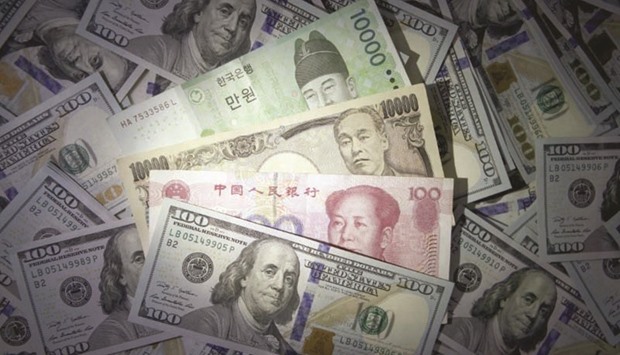Falling Asian currencies volatility is attracting investors to the region’s bonds as they seek stable returns while waiting for political risk events in the US and Europe to unfold.
Schroder Investment Management Ltd said the lull in Asian currencies is a chance to accumulate the region’s sovereign debt while the steadier Indonesian rupiah and Indian rupee are drawing Aberdeen Asset Management Plc to their bond markets.
“With the Trump election over and increasing clarity on his potential policies, markets have settled down in Asia,” said Manu George, a Singapore-based fixed-income director at Schroder Investment which oversees £375bn ($470bn) globally. “Asia emerging markets have attractive valuations on local currency bonds and a generally robust credit footing.”
Swings in regional currencies like Indonesia’s rupiah and the Malaysian ringgit have dropped after peaking in November following President Donald Trump’s election. Treasury Secretary Steven Mnuchin’s comments on Thursday to delay calling China a currency manipulator and Trump’s recognition of the One-China policy have also wound back concerns of a trade war. The steadier tone in emerging Asian currencies “owes a lot to the big unwind of dollar longs built up heading into the US elections,” said Edwin Gutierrez, head of emerging market sovereign debt in London at Aberdeen Asset Management which oversaw $374.0bn as of end-2016. “Some of the biggest shorts in place were against the South Korean won. The fact that the worst fears of US protectionism towards China have yet to materialise also helps.”
Three-month implied volatility in the rupiah is at its lowest since May 2013 after reaching an 11-month high in November. Ringgit volatility also peaked at a one-year high in November before falling to a two-year low last week. Three-month implied volatility on South Korea’s won has fallen to 11.09% from as high as 12.26% in mid-November.
Not everyone thinks the calm in Asian currencies is sustainable. RBC Capital Markets warned Trump’s budget plans and the Federal Reserve’s March meeting may disrupt the peace.
“There are a lot of potential potholes ahead in the coming two to three months,” said Sue Trinh, head of Asia foreign-exchange strategy at RBC in Hong Kong. “We see the low volatility in the region driven by huge inflows recently, but these are unlikely to continue.” Global funds have poured over $11bn into India, Indonesia, South Korea and Thailand’s bond markets this year, data compiled by Bloomberg show. Foreign ownership of Indonesian debt reached 689.3tn rupiah ($52bn) this week, a record based on Bloomberg data going back to 2002, as economic reforms gained traction and a tax amnesty bolstered state revenue. Malaysian bonds have stabilised after the ringgit rebounded from a 1998 low following a central bank clampdown on non-deliverable forward trading.
Volatility in the euro against the dollar remains elevated as anti-establishment politicians gain ground ahead of key elections in the Netherlands and France. The Deutsche Bank FX Volatility Index, which measures three-month volatility in nine major currency pairs, is up 54 basis points since the start of November.
“Emerging Asia currency volatility has declined as risk assets have continued to perform well and the cost of waiting for risks to materialise is quite high,” said Divya Devesh, a foreign-exchange strategist at Standard Chartered in Singapore. “For developed markets and in particular for euro-dollar, the upcoming French elections has kept implied volatility propped up.”
French National Front leader Marine Le Pen gained ground on her rivals in opinion polls with promises to take France out of the EU if she becomes president. The Netherlands’ Freedom Party’s campaign to bar immigrants from Muslim countries has left it riding high in opinion polls ahead of March parliamentary elections.

South Korean won, Chinese yuan, Japanese yen and 100 US dollar notes are seen in this file photo. Falling Asian currencies volatility is attracting investors to the region’s bonds as they seek stable returns while waiting for political risk events in the US and Europe to unfold.


